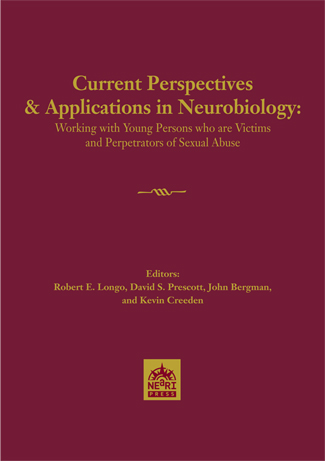Current Perspectives & Applications in Neurobiology: Working with Young Persons who are Victims and Perpetrators of Sexual Abuse
Editors: Robert E. Longo, David S. Prescott, John Bergman, and Kevin Creeden
© 2012ISBN: 978-1-929657-67-4
Available from NEARI Press
from the Introduction
Soon after the new millennium, mental health professionals of all disciplines attending conferences began to hear in plenary sessions, keynotes, and individual workshops, information and scientific research that addressed the human brain. This was no different for those of us who attended conferences and workshops that focused on the victims of sexual abuse and/or the perpetrators of sexual abuse. The message could at times be encouraging and disconcerting. The bad news was that trauma could have a profound impact on the brain, often from a very early age. The good news was that there was such a thing as brain plasticity, and that it was possible to help people. The bad news was that the emerging brain research seemed to focus more on changes in the brain than how professionals could actually affect positive changes. The good news now is that many excellent scientist-practitioners have developed excellent means by which professionals can help others. This is the impetus behind this book.
Contents
Foreword
David Burton, MSW, Ph.D
- Part I – Introduction and Overview
Introduction
Robert E. Longo, MRC, LPC, NCC, BCN, & David S. Prescott, LICSWChapter One
Current Perspectives & Applications in Neurobiology: An Overview
Robert E. Longo, MRC, LPC, NCC, BCN, and David S. Prescott, LICSWChapter Two
The More Things Change, The More They Remain the Same
Geral T. Blanchard, LPCChapter Three
Where We Are and Where We Need To Be: Assessment and Treatment of the Past, Present, & Future
David S. Prescott, LICSWChapter Four
Adolescents Who Have Sexually Abused: Trauma & Executive Functioning
David L. Burton, MSW, Ph.D
- Part Two – Theory and Understanding
Chapter Five
An Interpersonal Neurobiology View of Trauma
Eric R. Bergemann, Ph.D, MBAChapter Six
Brain Function Assessment and Neurotherapy for Sexual Abuse
David A. Kaiser, Ph.D, & Andrea Meckley, MAChapter Seven
Neuroscience Applied to the Therapeutic Milieu
Jerry Yager, Psy.D, & Matthew Bennett, MA, MBAChapter Eight
Combining Neuroscience, Education, and Therapy: Practical Applications for Treatment Planning for Youth who have Sexually Abused
Nicki Hopwood MSW, LCSWChapter Nine
Working with Juveniles with Sexually Abusive Behaviour in the UK: The G-MAP Approach
Dawn Fisher, B.A. Hons., M.Clin. Psych., Ph.D., Julie Morgan, BSc, MA, PGCert SW, CQSW, Bobbie Print, CQSW, & Sharon Leeson, RNMH, Dip HEChapter Ten
Traumatic Brain Injury (TBI): A Brief Introductory Overview
Robert E. Longo, MRC, LPC, NCC, BCNChapter Eleven
Ethical Responsibilities in Neuroscience and Neurobiology
Robert E. Longo, MRC, LPC, NCC, BCN, & David S. Prescott, LICSW
- Part Three - Interventions
Chapter Twelve
Brain-to-Brain, Body-to-Body: A Sensorimotor Psychotherapy Perspective on the Treatment of Children and Adolescents
Pat Ogden, Ph.D., Bonnie Goldstein, LCSW, Ph.D., & Janina Fisher Ph.DChapter Thirteen
Sensory Integration and Trauma
Marsha Raredon OTR/L, Janet Reilly Jackson MOT, OT/L, & Peg Ingolia MS, OTR/LChapter Fourteen
Teaching, Intervening and Counseling with the Brain in Mind
Penny Cuninggim, MAT, MSW, Ed.D., & Steven Bengis, Ed.D., LCSWChapter Fifteen
Medications and the Brain
Robert E. Longo, MRC, LPC, NCC, BCNChapter Sixteen
Working With Sexually Abusive Behavior and Traumatic Brain Injury: A Case Study
Robert E. Longo, MRC, LPC, NCC, BCNChapter Seventeen
The Theatre of Meeting: The History of Drama and Other Experiential Therapies as Neurological Analogs
John Bergman, MA, RDT, MT, BCTEnd Word
Robert E. Longo, MRC, LPC, NCC, BCN & David S. Prescott, LICSWNEARI Press Publications
Review comments:
“In summary, this is a forward-thinking foundational text. Advancements in developmental neuroscience and findings about the teen brain have permeated legal theory and have resulted in a call for differential treatment of youthful offenders.”
— George S. Leibowitz, PhD, LICSW
Assistant Professor of Social Work
University of VermontReview published in the ATSA Forum, Vol. XXV, No. 1 Winter 2013.
Click here for full review text. (.PDF format, requires Adobe Reader)
